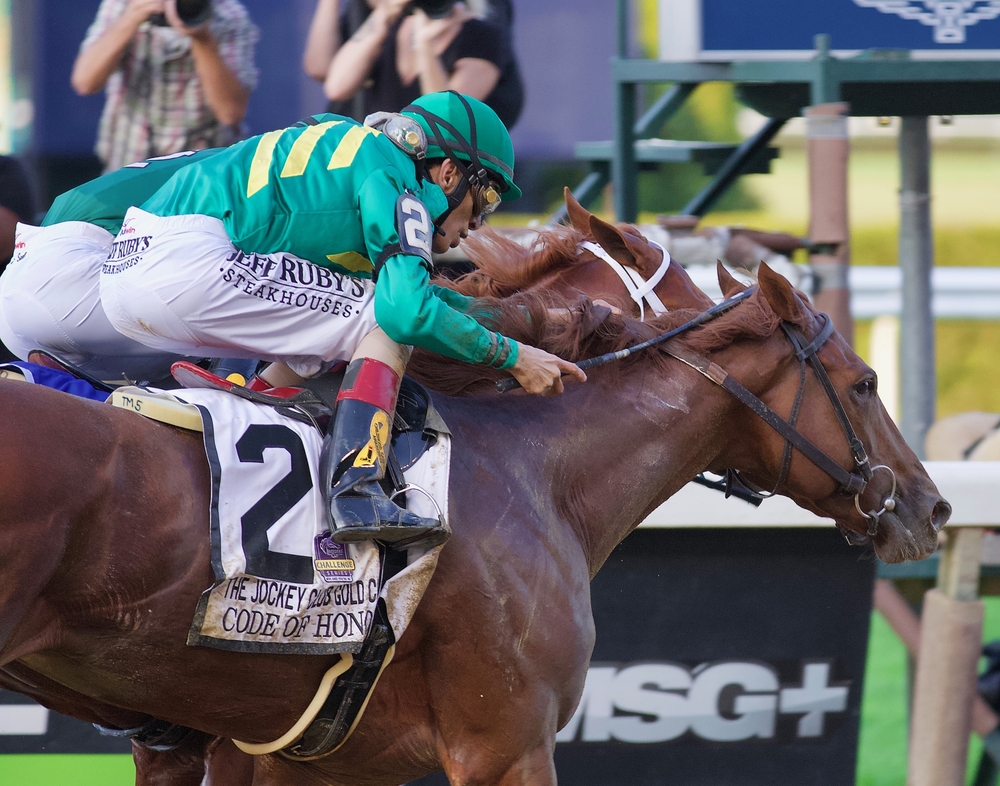In the world of horse racing, the fairness and integrity of the sport are guarded by a crucial process known as a Stewards’ Enquiry. This enquiry takes place whenever there is a potential breach of the racing rules or a race day incident which may have influenced the outcome of a race. Stewards, who are officials appointed to oversee races, are responsible for deliberating on these matters, ensuring that every race is run fairly and in accordance with the established rules.
The process is initiated when an incident during a race, such as interference between horses or a riding offence, is observed. The Stewards will then convene to examine the evidence, which often includes reviewing race footage and interviewing the involved jockeys and trainers. Decisions made by the Stewards can have significant implications, ranging from the demotion of placed horses to fines or suspensions for the parties involved. At its core, the Stewards’ Enquiry is designed to maintain the sport’s credibility and uphold the highest standards of competition.
Key Takeaways
- Stewards’ Enquiries ensure fair racing and rule adherence.
- Enquiries investigate incidents and rule breaches that may affect race outcomes.
- Stewards’ decisions carry weighty implications for the sport’s integrity.
Need Help Beating the Bookies?
Our expert betting tipsters have been taking cash off the bookies since 2014! If you need a helping hand with winning then why not check them out?
Browse Our Tipsters
Euro Football Punter
Simple Yet Highly Profitable Football Tipster Focussing on the Major Leagues
Visit PROFILEOverview of Horse Racing Stewardship
In the fast-paced world of horse racing, the role of stewards and the stipendiary steward is vital to maintain the integrity and fairness of the sport. Their responsibilities are extensive and crucial for upholding the rules of racing.
Role of Stewards in Horse Racing
Stewards are the arbiters of horse racing, responsible for ensuring that all races are conducted fairly and in compliance with the sport’s regulations. They investigate any incidents that occur during a race, such as interference between horses or potential breaches of racing rules. Their decisions can include the reversal of race results or the imposition of penalties for riders or trainers found to be in breach of the rules.
Composition of the Stewards’ Panel
The stewards’ panel typically consists of a mix of professionals who are either paid or volunteer their time. They come from various backgrounds within the racing industry, bringing a breadth of experience to their decision-making processes. The panel operates with authority over all Flat and National Hunt races in the UK and Ireland.
Stipendiary Steward and Their Duties
The stipendiary steward, a salaried official, holds particular responsibilities at the racecourse. Their duties extend to the enforcement of racing rules, advising the stewards’ panel, and carrying out investigations into breaches of conduct. They often lead the stewarding team and act as the key liaison between the on-course officials and the racing authorities, ensuring that every race adheres to the highest standards of integrity and safety.
Stewards’ Enquiry Process
In the context of horse racing, the Stewards’ Enquiry is a critical process that ensures the integrity of the sport by reviewing incidents that may have affected the race outcome.
Triggering a Stewards’ Enquiry
A Stewards’ Enquiry is typically initiated when there’s an incident during a race that potentially breaches racing rules. Incidents such as interference between horses or riding offences can lead to the commencement of an enquiry. Also, a klaxon sounded after the race suggests that a Stewards’ Enquiry is forthcoming.
Steps and Procedures
Once an enquiry is initiated, the following steps are generally taken:
- Incident Review: Racecourse stewards examine the incident by checking video footage and any other available evidence.
- Hearing: Involved parties, usually jockeys and trainers, are questioned by a panel which includes the stipendiary steward.
- Deliberation: After hearing testimonies and reviewing evidence, the stewards convene privately to deliberate.
- Decision: A conclusion is reached, and relevant parties are called back to be informed of any rulings, which may include disqualifications or changes to the race result.
- Reporting: A formal report stating the findings and any actions taken is produced and relayed to the racing authority.
Use of Technology in Enquiries
Technology plays an integral role in the Stewards’ Enquiry process:
- Video Footage Analysis: Multiple camera angles are used to provide a comprehensive view of the race, helping stewards make informed decisions.
- Recording Devices: Audio and visual recording devices are employed to ensure accurate capture and recall of testimony during the enquiry hearings.
Racing Rules and Regulations
In horse racing, meticulous rules uphold the sport’s integrity, with every race subject to official scrutiny to ensure fair competition and the safety of all participants.
Rules of Racing
The British Horseracing Authority (BHA) sets forth the Rules of Racing that govern the sport within the UK. These rules outline the standard for races to be conducted, detailing the responsibilities of trainers, jockeys, and owners, alongside the conditions under which races should be run. The regulation encompasses everything from the pre-race procedures, such as weigh-ins, to the post-race routine, including the criteria for awarding race results.
Racing Offences and Penalties
Horse racing stewards enforce racing rules and may hold enquiries to investigate potential infractions. Offences include careless riding, where a jockey fails to ride with the necessary due care and consideration for other competitors, and dangerous riding, which poses a threat to the safety of others on the track.
- Careless Riding:
- Resulting from a lack of due care and attention to surrounding horses and jockeys.
- Penalties: Can range from cautions to suspensions for the offending jockey.
- Dangerous Riding:
- Constitutes a deliberate or particularly negligent disregard for the safety of others.
- Penalties: Typically result in stiffer suspensions or fines for the jockey, reflecting the serious nature of the offence.
Upon finding a rule breach, the panel can impose penalties, such as fines or bans, proportionate to the level of the infraction committed by the jockey or trainer. These actions ensure that the sport adheres to strict welfare and safety standards.
Race Day Incidents

When incidents occur during a horse race, they are scrutinised by the racecourse stewards to ensure fairness and adherence to racing regulations. These can range from the start and course of the race, to the conduct of the jockeys and the interaction with hurdles and fences.
Start and Course Interference
The beginning of a race is critical, and stewards review cases where one horse may impede another, affecting the race’s outcome. They investigate if a horse has been hampered or cut off during critical stages, such as at the start or any point on the course. Incidents on the course often lead to a steward’s enquiry to determine the impact on the competing horses and the overall race result.
Jockey Riding Behaviour Analysis
Jockeys are under close surveillance for their adherence to racing rules. Stewards analyse jockeys’ use of the whip and overall riding behaviour for any infractions, including dangerous or careless riding. Riders found to have breached the regulations could face penalties, and their actions could lead to race placings being altered.
Hurdle and Fence Regulations
Races that include hurdles and fences have additional layers of complexity and risk. Stewards monitor for any irregularities in how horses navigate these obstacles. Instances where a horse or jockey does not negotiate a hurdle or fence within the rules can lead to an enquiry. The integrity of the race is paramount, and any deviation from the set regulations regarding hurdles and fences is treated with the utmost seriousness by stewards.
Outcomes and Implications

In the world of horse racing, the decisions made by stewards during and after a stewards’ enquiry can have significant and varied effects on race results, jockey standings, and the racing community’s financial aspects.
Result Alterations
When a stewards’ enquiry discovers interference or a rule violation during a race, the outcome can lead to the alteration of results. If a horse is determined to have unfairly interfered with another, the stewards may decide to demote the offending horse’s finishing position. Conversely, the affected horse could be promoted, impacting the final results.
Disqualifications and Appeals
Investigations may conclude with a horse being disqualified for breaching racing rules. A horse may also be disqualified if found to be “not weighed in” correctly post-race. Jockeys and trainers involved with the disqualified horse have the right to appeal against the stewards’ decision, though this process can be lengthy and outcomes vary.
Impact on Betting and Punters
The outcome of a stewards’ enquiry holds particular significance for bookmakers and punters. For betting purposes, there can be what’s known as a “double result” where both the original and amended results stand, affecting payout scenarios. Bookmakers may pay out on the initial result, the final result, or both, depending on their policy and the timing of the announcement. This can lead to either frustration or additional winnings for the punter.
Prominent Stewards’ Enquiries Case Studies
This section examines some notable stewards’ enquiries in horse racing, providing insight into the critical decisions made during high-stakes races and their impact on the outcomes.
Simple Verse vs. Bondi Beach
At the 2015 St Leger Stakes held at Doncaster Racecourse, a highly debated stewards’ enquiry took place involving Simple Verse and Bondi Beach. During the race, the two horses were involved in a critical incident, which led to the stewards disqualifying Simple Verse, the initial winner, for interference. However, after an appeal, the decision was overturned, and Simple Verse was reinstated as the official winner of the race.
Notable National Hunt Enquiry Cases
The Cheltenham Festival, a pinnacle event in the National Hunt racing calendar, has seen its fair share of stewards’ enquiries due to the highly competitive nature of the races. One memorable instance occurred when a race outcome was put under scrutiny for possible interference in the closing stages. The stewards meticulously reviewed the race footage and testimonies before making a ruling that preserved the integrity of the race and upheld the Rules of Racing.
In these instances, the decisions made during stewards’ enquiries not only affirmed the rules crucial to the sport’s fairness but also underscored the stewards’ significant role in maintaining the credibility of the racecourse outcomes.
Global Perspective
In horse racing, the steward plays a critical role in maintaining the integrity of the sport, but their operations do vary on a global scale. The British Horseracing Authority (BHA) sets an example in the UK, whereas international comparisons reveal differences in stewarding practices.
Stewards’ Role in British Horseracing Authority
In the UK, BHA stewards serve as the governing figures on raceday, ensuring that all rules of racing are adhered to for the fairness and safety of the sport. They are responsible for conducting enquiries whenever there are instances of possible interference or infractions during a race. Their decisions can determine the disqualification of horses, revisions in race results, and the handing down of penalties to jockeys or trainers if rules are broken.
Comparing International Stewards’ Operations
Internationally, stewarding functions differ significantly. For example, in France and Germany, there is a less voluntary element within their stewarding model, contrasting with the historical approach in the UK. Each nation has a bespoke set of protocols that might influence steward decisions differently from the way the BHA operates. French racing authorities rely on a combination of volunteer and full-time stewards, while German racing extends specific duties and responsibilities to their stewards in overseeing races, similar to those of their UK counterparts. Regardless of the country, the primary objective remains the same: to enforce racing rules and ensure a fair outcome for all participants, including trainers, jockeys, and equine athletes.
Frequently Asked Questions
This section addresses common inquiries regarding the processes and outcomes involved in stewards’ enquiries within horse racing.
What occurs during a steward’s enquiry in horse racing?
During a steward’s enquiry, officials review the race footage and testimonies to assess potential rule breaches. The stewards question jockeys or trainers and analyse evidence such as race recordings to determine if any infractions affected the race outcome.
What is the duration of a steward’s enquiry?
The length of a steward’s enquiry can vary greatly, from several minutes to much longer, depending on the complexity of the incident and the clarity of the information available.
Who is responsible for initiating a steward’s enquiry?
Stewards, who are officials present at the race meeting, initiate enquiries. They are responsible for maintaining the integrity of the sport and may call for an enquiry following a race if there’s suspicion of a rule violation.
What are the implications of a steward’s enquiry on race results?
A steward’s enquiry can lead to changes in the race result. If an infraction is determined to have impacted the outcome, the stewards may disqualify a horse, alter the race placings, or take disciplinary actions against jockeys or trainers.
How does the British Horseracing Authority report on steward’s enquiries?
The British Horseracing Authority provides a report on stewards’ enquiries detailing the findings and any penalties awarded. This report is made available to the public and relevant racing bodies.
What distinctions exist between an enquiry and an inquiry in the context of horse racing stewardship?
In horse racing, an “enquiry” refers specifically to the process where stewards investigate incidents during a race to enforce rules. “Inquiry” may also be used, but in British English, “enquiry” is more commonly linked with official investigations in general contexts.






